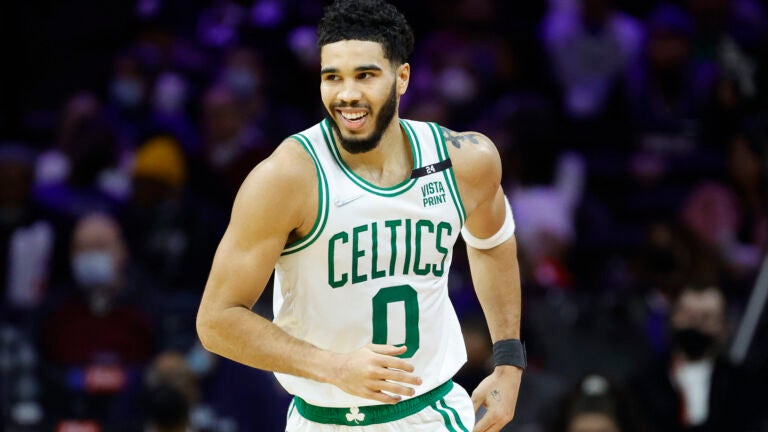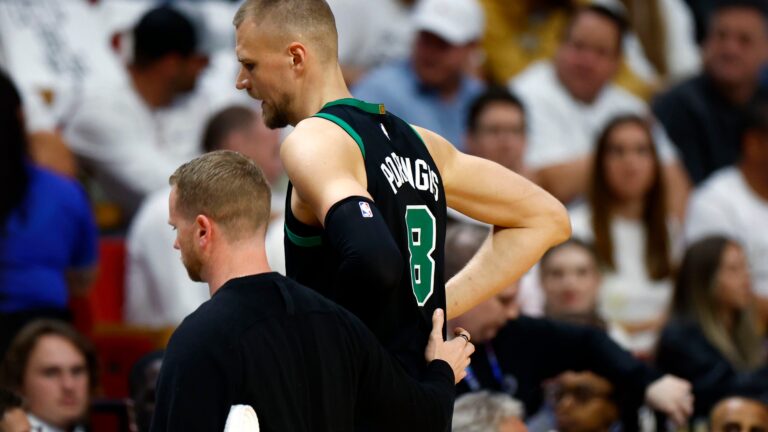Get the latest Boston sports news
Receive updates on your favorite Boston teams, straight from our newsroom to your inbox.

Last season, Jayson Tatum narrowly missed out on an All-NBA selection despite a career season that included multiple 50-point games, an All-Star appearance, and a host of impressive statistical achievements.
Missing out on All-NBA had ramifications. Had Tatum made it, he would have earned more than $30 million extra over the duration of his rookie-scale extension — a provision of the “Rose rule” in which players with less experience can earn up to 30 percent of the salary cap on a max deal instead of the standard 25 percent.
On Thursday, in a preview of an upcoming conversation with J.J. Redick on his podcast “The Old Man and the Three,” Tatum opened up about his All-NBA snub — the one time, he says, that everyone’s opinion of his game actually got to him.
Tatum was careful to note, with a chuckle, that missing out on money wasn’t the issue.
“There’s so much that bothered me with that whole situation,” Tatum told Redick. “I think the narrative was, ‘Jayson didn’t make All-NBA, he loses $30 million.’ From that headline, nobody is going to feel bad for me. I still got $175 million, nobody is going to feel bad, I don’t want anybody to feel bad about the money part. My lifestyle hasn’t changed. It’s not about that.”
The problem, according to Tatum, was the All-NBA process. Media members vote on All-NBA selections, and they are forced to put players into categories — many of which are obsolete in the modern game. Redick brought up the example of Bulls star DeMar DeRozan, who might traditionally be considered a small forward but who is a primary initiator (and thus a point guard of sorts) on the Bulls. Tatum is in a similar situation with the Celtics. Marcus Smart is the point guard, but Tatum has a usage rate of 32 percent — 13 percentage points higher than Smart, thus making him a de facto point guard as well.
Even with broad distinctions like “Guards,” “Forwards” and “Centers,” an inferior player might lose out to a better one simply because there were too many good forwards and not enough good guards. Redick and Tatum both said they approve of a system in which the best 15 players in the NBA are All-NBA, which would simplify the process for everyone involved.
Ask media members, and many would agree with Tatum’s overall take — most don’t want player salaries tied to their All-NBA votes. Both players and coaches alike have far more extensive knowledge of the game from countless hours of film study and game experience (and, of course, pure skill).
Speaking slowly — and choosing his words with care — Tatum noted that one media member said he didn’t vote for Tatum because he didn’t like his shot selection.
“The fact that somebody could have that thought and basically cost someone $30 million … I think that has to change,” Tatum said. “There’s no criteria set for the media voters on who they should vote for. It’s like all opinion-based. …
“I think there’s just a little too much on the line for that.”
Still, the bigger issue was recognition, and Tatum pointed to what he believes was a double-standard of sorts.
“For instance, last year I averaged like 26-7-4,” Tatum said, referring to points, rebounds, and assists. “And I’m certain you can’t find one person in the media that said I had a monster year. Seventh seed, two games above .500, it’s whatever, I wasn’t an MVP candidate or anything like that. But then there are guys that averaged, I don’t know, 19 and 10, 19-10-4, and you go on TV and it’s like ‘They are having a monster season.’
“I talked to my mom at home, and I was like, ‘Mom, I would probably have to average 30 and we’d have to be a top two seed for anybody to go on TV and say [I’m] having a monster year.'”
Tatum raises a nuanced conversation. On the one hand, expectations are high for Tatum because Tatum can achieve (and already has achieved) great things. With all due respect to Aaron Nesmith — a perfectly solid prospect in his own right — nobody expects him to become an MVP-caliber talent. Tatum has been the best player on an Eastern Conference finalist. He led the Celtics in playoff scoring in an Eastern Conference finals run his rookie season. He could be the NBA’s MVP someday. The expectations of a great basketball player are inherently ludicrous when measured against the expectations of an NBA player for whom a 19-point performance is a good one.
So to an extent, calling a 26-7-4 a monster year for Tatum would in fact be inaccurate. For Tatum, a “monster” season is probably something akin to what James Harden achieved during his 2017-18 MVP run — 30.6 points and 8.8 assists per game.
But that shouldn’t erase what Tatum achieved last season, nor should it be an excuse to downplay how good he was.
Again, the conversation is nuanced. Tatum might be wise to consider what it means that 26-7-4 is par for his course — a kid who grew up wanting to be Kobe Bryant has a chance to achieve everything Bryant achieved. Media members might be wise to consider a variety of factors, including what Tatum is asked to do on a nightly basis and how difficult scoring 26 points per game actually is. The NBA would be wise to consider why it puts the onus on media members to decide how much a player earns, further complicating an already fraught relationship between players and reporters.
The good news for fans? All they have to do is enjoy what Tatum does. After all, it’s all Wyc Grousbeck’s money.
Receive updates on your favorite Boston teams, straight from our newsroom to your inbox.

Stay up to date with everything Boston. Receive the latest news and breaking updates, straight from our newsroom to your inbox.
Conversation
This discussion has ended. Please join elsewhere on Boston.com